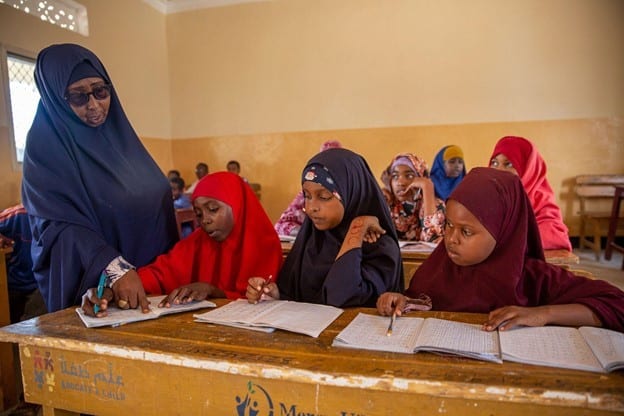Girls face an uphill struggle to attend school in many parts of the world. Whether it is prohibitive academic fees, domestic duties or families concerned about their daughters’ safety when outside the home, getting into the classroom can be a hurdle.
Na Somália, where only about one-third of all school-aged children and youth are enrolled, 65 por cento of girls are missing out on basic education. This disparity also continues into the teaching profession. Women make up only 15 percent of primary-level teachers and 4 por cento of the country’s secondary teachers.
Barra ou Barra is an education program in Somalia that is expanding access to accelerated basic primary education for out-of-school 9- to 16-year-olds. This USAID-funded project is a collaboration with the Somali Federal Government to provide children and youth an opportunity to catch up academically and enroll in the formal school system.
The program specifically targets marginalized out-of-school children, incluindo meninas, displaced children, rural children and poor households. By providing free education in the community, the project addresses some of the issues that keep girls out of the classroom.
Khadija Ali has been an educator for many years and currently serves as the headteacher of a Bar ama Baro-supported school in Benadir.
“Being a school headteacher is a challenging task in the Somali context where promoting female education is not seen as an essential role” says Ali. “As female teachers, we must advocate for girls’ education and convince parents of the need to send their daughters to schools.”
One of the program’s strategies is to recruit more female teachers, which has a positive impact on girls’ enrollment and retention.
“Families often feel more comfortable and safe enrolling their daughters when there are female teachers and headteachers at the school,”diz Ali.

Bar ama Baro mobilizes community education committees, which are similar to parent-teacher associations, to encourage women to apply to be accelerated education teachers. Durante o ano passado, the project enrolled nearly 19,000 girls and recruited 194 female teachers and headteachers.
Hani Mustaf is one of the people recruited and trained by the project to train Bar ama Baro teachers. She uses the teacher trainings as an opportunity to inspire more female teachers to join her ranks. “Our Somali girls need role models to emulate, and it is our duty as educated female teachers to step in and encourage girls to pursue an education and to reach their full potential,” says Mustaf.
This Somali Government is invested in supporting girls’ education.
“Increasing access for female students and recruiting more female teachers is a top priority for the Government of Somalia,” says Mohamed Abbi, Director General of Education, Culture and Higher Education.“We value the partnership with USAID and how the Bar ama Baro project is enabling us to reach more female students and female teachers”.
Durante os próximos três anos, Bar ama Baro will provide more than 100,000 children and youth aged 9 para 16 with quality accelerated basic education and will engage around 1,700 professores.